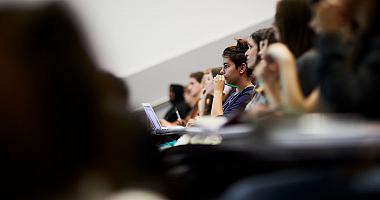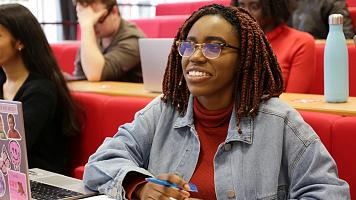BA (Hons)
International Relations
Content navigation menu
Why study BA International Relations at Goldsmiths
Our International Relations degree investigates the dynamics of a constantly changing world and develops your knowledge and skills to address the global challenges of the 21st century.
- A degree in international relations will provide you with an in-depth understanding of the processes and outcomes of world politics, including the relations between states, security and conflict, and global cooperation and governance.
- At Goldsmiths you will study these themes in a way that reflects the College’s reputation as an institution at the forefront of critical thinking in the arts, humanities and cultural studies.
- Our programme provides you with a contemporary perspective on international relations, one that prioritises Non-Western and Global South actors, institutions and ideas that challenge the post-Cold War liberal international order.
- Not only will you study the ‘high politics’ of international relations – war, multilateral cooperation and international trade and finance – but international politics 'from below', focused on climate change, migration, human rights, human security and indigenous demands for global justice.
- In line with the interdisciplinary approach to politics of the department, you will encounter ‘the international’ in diverse sites of cultural practices, including the politics of vision, non-Western political thought and music.
- Studying international relations at Goldsmiths you will acquire a wide range of transferable academic and research skills suitable for the workplace or postgraduate study.
- You can put your knowledge into practice with our work placement module. Work with organisations in the international relations sector, such as policy think-tanks, development agencies and NGOs and get real experience before you graduate.
- Studying an international relations degree in London means that Westminster, global business, and diverse diasporas are all in easy reach.
- When you join Goldsmiths you will become part of a global academic family, with students from more than 130 countries and alumni around the globe.
Contact the department
If you have specific questions about the degree, contact Jeremy Larkins.
UCAS code
L251
Entry requirements
A-level: BBB
BTEC: DDM
IB: 33 points overall with three HL subjects at 655
Length
3 years full-time
Fees
Home - full-time: £9535
International - full-time: £20650
Department
Watch videos about this course
What you'll study
You will study the following compulsory modules:
| Module title | Credits |
|---|---|
| World Politics | 30 credits |
| Colonialism, Power, Resistance | 30 credits |
| Everything is a Text | 15 credits |
| Researching our Lives and Worlds | 15 credits |
| Political Theory and Ideologies | 30 credits |
Note about optional modules (if available): The above is indicative of the typical modules offered, but is not intended to be construed or relied on as a definitive list of what might be available in any given year. The module content and availability is subject to change.
Work Placement module
This optional module gives students experience of working in a range of organisations in the NGO sector such as charities, think-tanks and pressure groups, bodies connected with international organisations, appropriate businesses, and political parties.
Teaching style
This programme is mainly taught through scheduled learning - a mixture of lectures, seminars and workshops. You’ll also be expected to undertake a significant amount of independent study. This may include carrying out required and additional reading, preparing topics for discussion, and producing essays or project work.
How you'll be assessed
You’ll be assessed by a variety of methods, depending on your module choices. These include coursework, examinations, group work and projects.
Entry requirements
We accept the following qualifications:
A-level: BBB
BTEC: DDM
International Baccalaureate: 33 points overall with three HL subjects at 655
Access: Pass with 45 Level 3 credits including 30 Distinctions and a number of merits/passes in subject-specific modules
Scottish qualifications: BBBBC (Higher) or BBC (Advanced Higher)
European Baccalaureate: 75%
Irish Leaving Certificate: H2 H2 H2 H2
Alternative qualifications
See our full list of undergraduate entry qualifications.
We welcome students with a range of educational experiences. If you believe you may not meet the standard qualification requirements we would still encourage you to apply because we consider all aspects of your application when making a decision.
We’ll pay particularly careful attention to your personal statement, which is your opportunity to demonstrate your interest in the subject you’ve applied for. Your referees are also welcome to include any relevant contextual comments around your academic achievements. We’ll look at all these things when making a decision on your application, as well as your qualifications and grades, and may still be able to offer you a place.
We also offer this programme as an Integrated Degree in Politics and International Relations, where you will complete a foundation year before progressing on to the undergraduate degree. Progression on to the BA in International Relations requires you to successfully pass the foundation year.
International qualifications
We also accept a wide range of international qualifications. Find out more about the qualifications we accept from around the world.
If English isn’t your first language, you will need an IELTS score (or equivalent English language qualification) of 6.0 with a 6.0 in writing and no element lower than 5.5 to study this programme. If you need assistance with your English language, we offer a range of courses that can help prepare you for degree-level study.
Fees and funding
Annual tuition fees
These are the UG fees for students starting their programme in the 2025/2026 academic year.
- Home - full-time: £9535
- International - full-time: £20650
If your fees are not listed here, please check our undergraduate fees guidance or contact the Fees Office, who can also advise you about how to pay your fees.
It’s not currently possible for international students to study part-time if you require a Student Visa, however this is currently being reviewed and will be confirmed in the new year. Please read our visa guidance in the interim for more information. If you think you might be eligible to study part-time while being on another visa type, please contact our Admissions Team for more information.
If you are looking to pay your fees please see our guide to making a payment.
Funding opportunities
We offer a wide range of scholarships and bursaries, and our careers service can also offer advice on finding work during your studies. Find out more about funding your studies with us.
Additional costs
In addition to your tuition fees, you'll be responsible for any additional costs associated with your course, such as buying stationery and paying for photocopying. You can find out more about what you need to budget for on our study costs page.
There may also be specific additional costs associated with your programme. This can include things like paying for field trips or specialist materials for your assignments. Please check the programme specification for more information.
Watch international relations student Miranda Saul speak about when, in her second year, she visited the UN as an activist against gender-based violence.
Careers
Where your degree could take you
This degree will equip you for a range of careers in international relations, such as:
- Government, for example in the Foreign Office or Department of International Development
- International institutions such as the UN
- Foreign aid development agencies
- International NGOs, for example Oxfam, Human Rights Watch, Amnesty International
- International policy think-tanks and consultancies
- Private sector organisations and companies who trade and invest internationally
As a graduate from the BA International Relations you will also be well placed to continue to higher level study, such as masters-level study or postgraduate research in areas relating to international relations.
Find out more about employability at Goldsmiths.
Skills
Throughout your degree you’ll gain a broad knowledge of the international system, foreign affairs and relations between state and non-state actors. This will be complemented by specialist in-depth knowledge of political conflicts and cultures in different parts of the world.
Your hands-on experience working for an NGO or organisation involved in international activities and policy development will foster your professional skills and knowledge.
You'll also develop a wide range of key skills throughout your degree, including:
- Communication (including public speaking, developing and presenting an argument, note taking, report writing)
- Analytical thinking
- Awareness of social, political and cultural processes
- Awareness of social and cultural difference
- Ability to take creative approaches
- Attention to detail
- Team work
- The ability to undertake detailed research





